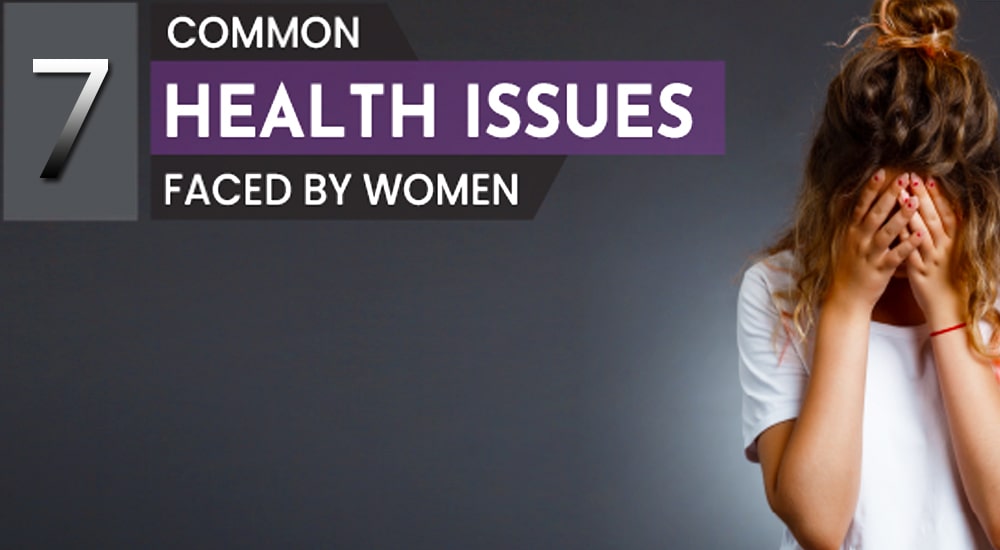
Introduction
Although both men and women share various similar chronic health issues, some health issues affect women differently and are more common in women than men. Considering the hectic schedule of a woman’s life, many women's health conditions go unnoticed or undiagnosed. This is why every woman should be aware of the potential health complications that may arise.
Scientists and health physicians are working together to increase the understanding of potential diseases impacting women. Read on to understand the most common concerns affecting women.
Most common diseases that affect women:
1. Breast cancer
Breast cancer is the most common type of cancer among women. This cancer occurs in milk ducts and spreads to other body organs. Latest statistics have shown that every year around half a million women across the globe die due to breast cancer. From increasing age to family history, a range of factors can increase the risk of developing breast cancer.
Family medical history, dense breast tissue, history of chest wall radiation and breast biopsy can increase your risk of developing breast cancer. However, in certain cases, women with breast cancer do not have any potential risk factors except increasing age. Apart from these, as per many doctors, certain lifestyle factors such as poor diet, limited physical activity, obesity, smoking, and alcohol use can also increase one’s risk of developing breast cancer.
2. Heart disease
According to the Centers for Disease Control, heart disease is one of the leading causes of death for women across the world. Coronary artery disease, heart failure and arrhythmia are the most common heart diseases that affect women of all ages.
A buildup of plaque in the artery walls can cause coronary artery disease. Plaque buildup in the artery can form a blood clot and restrict blood flow to the heart. This can lead to a heart attack. Arrhythmia is a condition where your heart beats too fast or too slow.
High blood pressure, high blood sugar, high blood cholesterol, obesity, low physical activity, and smoking are common risk factors for heart disease. Most women above 40 have at least one risk factor for heart disease.
3. Ovarian cancer
Ovarian cancer is prevalent in women. This cancer first starts in one fallopian tube and spreads to other organs like the uterus, pelvis and spleen. Ovarian cancer affects the complex cells in the ovaries. This type of cancer often does not cause any symptoms until it has spread to the outside of the ovary. However, this cancer tends to show unclear symptoms.
4. Cervical cancer
Cervical cancer occurs in the lower uterus which connects the uterus with the vagina. This cancer causes abnormal growth of the cervix cells. There are mainly two types of cervical cancer, such as squamous cell carcinomas and adenocarcinomas. Nearly, 80-90% of cervical cancer is squamous cell carcinomas, and only 10-20% are adenocarcinomas.
Human papillomavirus or HPV infection is a prevalent cause of cervical cancer among most women. This infection generally goes away on its own, However, it may lead to cervical cancer over time. Also remember, not all HPV infection leads to cervical cancer. Cervical cancer generally does not cause noticeable symptoms during the early stages. Therefore, getting regular screenings for cervical cancer is the only way to avoid this cancer.
5. Reproductive health issues
Reproductive health issues may affect both the physical and mental health of a woman. PCOS, endometriosis, uterine fibroids, gynaecological cancer, and interstitial cystitis are the common reproductive health issues most women experience. Apart from that, women over age 35 most commonly experience infertility.
Infertility is the condition when a couple fails to conceive even after a year of trying. Various factors, such as age, weight, medical conditions (PCOS, endometriosis), medical treatments, and other lifestyle choices can increase one’s likelihood of having fertility issues. Although certain risk factors like age cannot be controlled, you can manage other lifestyle habits to avoid pregnancy complications. Fortunately, various advanced treatments can help to treat fertility issues.
6. Gynecological health issues
In addition to reproductive health issues, other gynaecological health concerns also impact a woman’s health. Some of the most common gynaecological health issues women experience are pelvic pain, menstrual disorders, urinary incontinence, cervical dysplasia, and pelvic floor prolapse. To avoid unwanted gynecological problems, make sure to get regular checkups.
7. Depression and anxiety
Women are more likely to experience depression and anxiety than men. Depression and anxiety can affect the whole body, including one’s mind and body. Depression is much more than the general feeling of sadness. Just like any other medical condition, it is crucial to recognize depression, because it may require treatment. The common symptoms that one may experience with depression include:
On the other hand, anxiety is a usual defence mechanism of the body. Normal anxiety can even help alert the body of a threat. In this situation, a person can feel vague worries or even experience a racing heartbeat. However, anxiety may become an issue if it interferes with day-to-day life. Anxiety disorders usually run in the family. There are multiple types of anxiety disorders, including generalized disorder, obsessive-compulsive disorder, social anxiety, post-traumatic stress disorder, and panic disorder. Similar to depression, anxiety disorder also requires treatment.
Conclusion
In this article, we have looked at a few of the major health concerns that women deal with. Regardless of gender, health is our main priority. To avoid unwanted health consequences, it is crucial to take precautionary steps. To lead a healthy life, try to have a balanced diet and healthy lifestyle routine. Also, it is important to get routine health screenings to detect a condition at its initial stages.